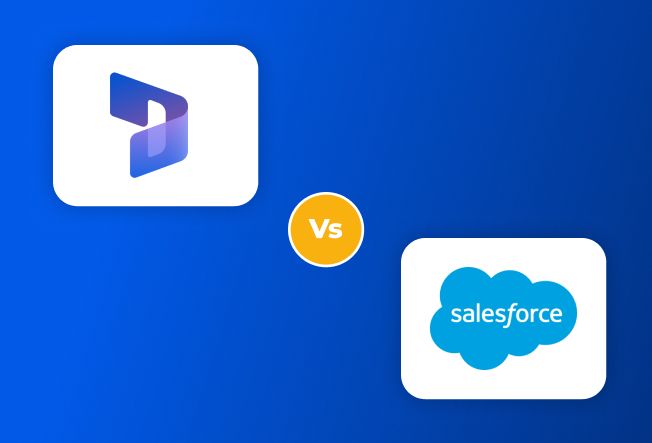Unlocking the Potential of D365 Fleet Management [Illustrated by a Case Study]
Oct 12, 2023 Aiswarya Madhu
D365 Fleet Management is an integral component of Microsoft's Dynamics 365 F&SCM suite. Tailored for businesses managing a fleet of vehicles, it offers a unified platform to oversee and control the entire fleet lifecycle, from leasing and rentals to maintenance and compliance. By integrating advanced analytics and real-time data, fleet management in D365 empowers businesses to make informed decisions, enhancing efficiency and productivity across the board.
Let’s explore how does fleet management in D365 helps you improve logistics efficiency.
On this page
Top Use Cases of D365 Fleet Management
Dynamics 365 Fleet Management offers a comprehensive solution for streamlined inbound and outbound logistics. Inbound logistics benefit from rapid quality checks and put-away clusters, ideal for efficient handling of diverse shipments, particularly in retail. Warehouse Operations tools include product dimension packaging, item consolidation, and location utilization, crucial for precise control, especially in fashion. Outbound logistics features like small package shipping, system-directed work sequencing, and wave load building optimize processes, facilitating smooth shipments to large retailers with strict requirements.
Here are some of the top use cases of Dynamics 365 fleet management:
Driver Profile Management
- Automated Driver Insights: Dynamics 365 captures and records crucial driver data, including locations, trips, and driving behavior, simplifying monitoring.
- Driver Profiling: The system allows for in-depth driver profiling, which helps in evaluating their performance, adherence to safety rules, and overall efficiency.
- License Validation: Dynamics 365 ensures that your drivers are always road-ready by validating their licenses and certifications.
- Rule Violation Alerts: The platform actively alerts fleet managers to extended driving hours and rule violations.
Efficient Trip Scheduling and Fuel Savings
- Streamlined Trip Creation: Dynamics 365 simplifies trip scheduling by providing tools to create trips with precise instructions and waypoints.
- Optimal Routes: The platform employs predictive analytics to suggest optimal routes that minimize fuel consumption.
- Route Planning Made Easy: Searching for routes, assessing their feasibility, and printing out directions become effortless with Dynamics 365.
Proactive Vehicle Maintenance
- Scheduled Maintenance: Dynamics 365 empowers fleet managers to create maintenance schedules based on industry standards.
- Tracking Vehicle History: The platform maintains comprehensive records of vehicle maintenance and service history.
- Budget Monitoring: Managing maintenance costs is a breeze with Dynamics 365.
Real-Time Vehicle Tracking and Control
- Live Vehicle Visibility: Dynamics 365 offers real-time visibility into your vehicles' locations, historical routes, speed, idling time, and driver behavior.
- Live Traffic Updates: The platform provides live traffic updates, helping your drivers avoid congestion and stay on schedule.
- Enhanced Security: Dynamics 365 monitors excessive speed and tracks unauthorized vehicle use.
- Personalized Mapping: You can create custom geo-zones and landmarks, tailoring the mapping system to your specific needs.
Optimizing Tire Efficiency
- Comprehensive Tyre Data: Dynamics 365 tracks comprehensive tire data, including serial numbers or Tyre Card numbers, transaction history, current mileage, and tire life status.
- Maximizing Tire Efficiency: Armed with this data, you can optimize tire efficiency, ensuring that your fleet's wheels are in the best condition possible.This not only enhances performance but also extends the lifespan of your tires.
Explore the transformative capabilities of D365 Intelligent Order Management, a key component in enhancing supply chain agility.
Want to Elevate Your Fleet Logistics Performance?
Tips to Set Up Fleet Management in Dynamics 365
While Dynamics 365 doesn't have a dedicated "Fleet Management" module, you can still manage your vehicles using the Finance and Operations (F&O) application. Here's a simplified guide to get you started:
1. You'll Need:
- The right license: Ensure your organization has the Dynamics F&O license with the "Transportation Management" module.
- Admin access: You'll need system administrator access to configure settings.
2. Finding the Tools:
Navigate to Modules > Supply Chain Management > Transportation Management. Here's where you'll find the tools to manage your fleet.
3. Setting Up the Basics:
- Vehicles: Add information about your vehicles, including type, license plate, model, and capacity.
- Drivers: Create profiles for your drivers, listing their names, licenses, and contact details.
- Maintenance Plans: Define schedules for servicing different vehicle types, specifying intervals, tasks, and who's responsible.
- Routes: Plan delivery routes with stops and sequences for optimized efficiency.
When to Get Help?
While this guide gets you started, setting up D365 fleet management can get complex depending on your needs. Here's why you might need expert guidance:
- Advanced Features: D365 offers deeper functionalities not covered here, like fuel management, driver performance tracking, and real-time vehicle location. An expert can help you navigate these features.
- Customization: You might need to customize the system to fit your specific workflow or integrate with other tools. An experienced partner can create these tailor-made solutions.
- Data Migration: If you're already using a different fleet management system, migrating data to D365 requires expertise to ensure accuracy and avoid disruptions.
A Seattle-based freight firm achieved operational and customer service excellence by upgrading to Dynamics 365. Faced with challenges from an outdated CRM system, they streamlined operations, improved customer service, and boosted supply chain efficiency. Dynamics 365 provided a 360-degree view, enabling rapid shipment processing, real-time interactions, and proactive notifications, resulting in a 15% reduction in transportation costs. Read the full case study
Challenges in Fleet Management Addressed by Dynamics 365
1. Manual Processes: Administrative tasks like invoicing, dispatching, and communication can be time-consuming and error-prone. D365 automates these processes, freeing up resources and improving accuracy.
Imagine a bank facing delays in ATM cash replenishment due to manual routing and documentation. D365 streamlines dispatching and automates reports, ensuring timely and efficient cash deliveries.
2. Volatile Fuel Prices: Fluctuations in fuel prices can significantly impact fleet budgets. D365 provides tools for route optimization, fuel-efficient vehicle selection, and fuel management to minimize costs.
A manufacturing company experiencing rising fuel costs impacting their transportation budget. D365 helps optimize routes, suggest fuel-efficient vehicles, and track fuel consumption, enabling cost-saving strategies.
3. Unforeseen Breakdowns: Lack of timely maintenance can lead to unexpected breakdowns and disruptions. D365 facilitates preventative maintenance scheduling, predicting potential issues before they occur.
A retail delivery truck suffers a breakdown due to inadequate maintenance, causing late deliveries and frustrated customers. D365 helps schedule maintenance based on usage data, preventing breakdowns and ensuring smooth deliveries.
4. Communication Gaps: Ineffective communication with drivers can lead to delays and disruptions. D365 offers real-time communication tools, allowing dispatchers to connect with drivers instantly.
A global logistics company encounters delays due to a driver stuck in traffic with no way to communicate. D365 allows real-time communication, enabling rerouting and minimizing disruptions.
5. Inefficient Coordination: Coordinating diverse fleets across locations can be challenging, leading to uneven service levels. D365 provides a centralized platform for managing all fleet activities, ensuring consistent service across locations.
A retail chain struggles with inconsistent stock levels due to uncoordinated deliveries. D365 facilitates efficient scheduling and coordination, guaranteeing optimal inventory levels at every store.
Additional Challenges Addressed:
Data Overload
D365 integrates data from various sources, providing a unified view and actionable insights.
Operational Costs
D365 helps optimize routes, fuel usage, and maintenance, minimizing operational costs.
Uptime Maintenance
D365 allows for predictive maintenance, ensuring maximum vehicle uptime.
Lack of Actionable Insights
D365 transforms data into actionable insights for optimal decision-making.
Software Adoption
D365 offers a user-friendly platform, encouraging software adoption and improved fleet management.
Let’s Wrap Up
As the transportation landscape evolves, Microsoft's commitment to providing cutting-edge solutions becomes increasingly evident. The Dynamics 365 Fleet Management solution is a testament to this commitment, offering a scalable and adaptable platform that caters to the unique needs of modern-day fleet operations.
At Nalashaa Digital, we offer a comprehensive suite of services to empower your business's fleet and logistics operations using Dynamics 365 F&SCM. Get in touch with us to leverage D365 for fleet management.
Recent Posts

D365 vs Salesforce [Survive with the Most Adaptable Solution]
Jul 12, 2024

Can Dynamics 365 Be Used as a Ticketing System?
Jul 11, 2024

Top 20 Dynamics 365 Supply Chain Management Features
Jul 09, 2024
Category
Our Expertise
About Author

Aiswarya Madhu
In the ever-changing tech landscape, my mission is to craft content that simplifies complex concepts and brings the wonders of modern technology closer to my audience. With a rich experience spanning over 2 years, I have honed my skills in crafting captivating and informative content for B2B domain that deeply resonates with the tech-savvy audience. When not working, you'll often find me with a steaming cup of tea and an inspiring book, fueling my curiosity and passion for knowledge.
Never Miss News
Want to implement Dynamics 365?
We have plans which will meet your needs, and if not we can tweak them around a bit too!


